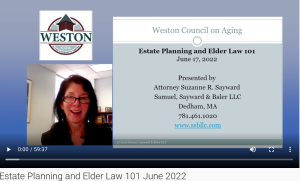The Massachusetts estate planning world watched with bated breath this summer as we came closer than ever to increasing the Massachusetts estate tax threshold from $1 million to $2 million. But alas, it was a false alarm.
As you may know, Massachusetts is one of only 11 states plus the District of Columbia to have a separate state estate tax. Among those states, Massachusetts and Oregon are the two states with the lowest estate value that is subject to estate tax – $1 million. If you die a resident of Massachusetts and own assets valued at $1 million or more, you will currently pay tax on the entire value of your estate.
Every year there are bills filed in the Massachusetts state legislature to increase the Massachusetts estate tax exemption. This year, both the Massachusetts House and Senate passed bills that would raise the estate tax threshold from $1 million to $2 million, and it looked like the bills would be reconciled and become law. However, at the last minute, the Governor raised the possibility that a 1986 law would trigger a requirement that the state return to taxpayers over $2 to $3 billion due to the state’s large budget surplus. Needless to say, that put the brakes on any other form of tax relief until things are sorted out.
In the meantime, what’s a middle-class Massachusetts family to do about saving estate taxes? As we all know, if you own a home in this state you are probably at least halfway to the $1 million estate tax threshold without even trying. Add to that the value of some life insurance, bank accounts, investments and/or an IRA or 401k and you are likely over $1 million without even trying.
For married couples in Massachusetts, credit shelter trusts are a go-to estate tax planning strategy which allows up to $1 million of assets to be “sheltered” in trust at the death of the first spouse to die such that those assets will not be subject to estate tax in the estate of the second spouse to die. The surviving spouse can serve as Trustee of the trust and use the sheltered assets, as needed, for the surviving spouse’s health care and living expenses after the first spouse’s death. If a credit shelter trust is created and funded appropriately, and depending on the size of the estate, the estate tax savings is significant. For example, a married couple with $2.5 million in assets would pay $139,000 in Massachusetts estate tax at the death of the second spouse without any tax planning. If a credit shelter trust is in place and funded with $1 million at the death of the first spouse to die, the estate tax payable at the death of the second spouse would be reduced to $64,000, saving $75,000 in estate tax.
For single individuals, estate tax savings involves giving up control of assets, usually in the form of giving assets away to family members, charities or other beneficiaries. Annual exclusion gifts of $16,000 per year per person can be given to as many individuals as desired each year without the need to file a gift tax return or pay any gift tax (unless these gifts exceed $12 million in total under current law). These annual exclusion gifts, especially if given consistently over time, can reduce the value of the assets that will be subject to estate tax at death, and the corresponding tax that will be paid. Gifts can also be given in unlimited amounts to pay tuition or medical expenses for another person. However, before making gifts during life, the gift giver must carefully consider whether they can afford to do so. Future living expenses and care costs are difficult to predict. It may be smarter to retain control of assets to be sure living expenses and care costs in the preferred care setting can be paid, rather than worry about saving estate tax for heirs. If the value of a person’s assets is diminished at the time of death due to spending on living and care expenses during life, the estate tax will be reduced naturally.
However, for single individuals with assets in excess of the estate tax threshold who are confronted with a terminal illness or a situation where death is imminent, deathbed gifts are a useful strategy to reduce estate taxes payable at death. Gifts made immediately before death will reduce the value of the assets on which Massachusetts estate tax will be paid after death. These gifts are possible only if the gift-giver is competent to make the gifts, or has a Durable Power of Attorney that specifically permits gifts to be made.
A few things to keep in mind when contemplating deathbed gifts:
- If checks are written for gifting purposes, those checks must clear the bank account before death in order for the gift to be effective for estate tax purposes, and therefore it is better to make such gifts using bank checks that will withdraw the funds from the account immediately when the check is issued.
- As with any lifetime gift, gifts of appreciated assets transfer the gift-giver’s basis to the gift recipient, which will result in a capital gain tax if the gift recipient sells the gifted asset at a later date. Holding appreciated assets until death under current law will provide a step-up in basis, eliminating any unrealized capital gain. Consideration of the estate tax savings as compared to any future capital gain tax that would be paid is an important consideration in determining whether gifts of appreciated assets make sense.
- A gift tax return may need to be filed post-death to report any gifts made in excess of $16,000 per person.
- Even if gifts are made that reduce the value of the gift-giver’s assets below $1 million, there may still need to be a Massachusetts estate tax return filed and estate tax paid, although the assets given away will not be subject to tax. This is because gifts over $16,000 per person are considered when determining whether the value of the deceased person’s assets was $1 million or more at the time of death and whether an estate tax return must be filed. However, the estate tax due is calculated only on the value of the assets not given away. Although an estate tax return may still need to be filed, the estate tax paid will be less than if the gifts were not given.
Deathbed gifts are a difficult subject, and something that a family may not wish to discuss at such a sensitive time. However, they are a useful strategy for a single person who may have held off on gifting during life for the reasons mentioned above, and whose estate will be subject to estate tax if gifts are not made. It is important to get advice from an estate planning attorney if such gifts are contemplated, to make sure they are made the right way and using the right assets to achieve the most tax savings.
Stay tuned as we remain hopeful that the Massachusetts legislature will move forward to increase the estate tax exemption sometime soon, and make estate tax planning unnecessary for many residents of the Commonwealth.
Maria Baler, Esq. is an estate planning and elder law attorney and partner at Samuel, Sayward & Baler LLC, a law firm based in Dedham. She is also a former director of the Massachusetts Chapter of the National Academy of Elder Law Attorneys (MassNAELA), and the immediate past President of the Board of Directors of the Massachusetts Forum of Estate Planning Attorneys. For more information, visit www.ssbllc.com or call (781) 461-1020. This article is not intended to provide legal advice or create or imply an attorney-client relationship. No information contained herein is a substitute for a personal consultation with an attorney.
August 2022
© 2022 Samuel, Sayward & Baler LLC


